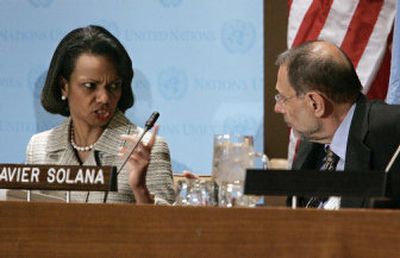New incentives to be offered to Iran

UNITED NATIONS – Britain, France and Germany said Tuesday that they are preparing a package of fresh incentives for Iran – including affordable energy and greater trade with the West – that would be granted if Tehran resumed negotiations on its nuclear program and agreed to halt the enrichment of nuclear fuel.
The initiative announced Tuesday – and the fact it was backed by the United States – reflected the Bush administration’s inability to persuade Security Council members Russia and China to back a United Nations resolution that takes a tougher line with Iran, including an implicit threat of sanctions.
Secretary of State Condoleezza Rice held a dinner meeting Monday night with Security Council members in another attempt to gain agreement on a more forceful approach. But diplomats said Moscow remains strenuously opposed on grounds that such a resolution could lead to military action.
The latest diplomacy is expected to delay for at least two weeks the U.S. effort to secure a U.N. resolution, according to diplomats. European negotiators plan to work in coming days to fashion a package of diplomatic carrots and sticks, including inducements for Iran to halt its nuclear activities as well as the prospect of sanctions if it does not.
Iran maintains that its nuclear program is aimed only at producing energy, but the United States and European nations suspect Tehran intends to develop nuclear weapons.
Rice endorsed the new approach, and Tuesday appealed to Iran to “return to the negotiating table.”
Iran made no public reply, and calls to its U.N. mission were not returned.
Rice insisted Tuesday that the Security Council is in “total agreement on the view that Iran cannot be allowed to have a nuclear weapon.” She added, “Let’s just give the diplomacy a little time to work.”
British and other European diplomats have argued for months that new negotiations with Iran are required to break the standoff in the council.
They have faced resistance from the Bush administration’s sharpest critics of engagement with Tehran. On Monday, U.N. Ambassador John Bolton questioned the virtue of negotiations with Iran, saying that diplomatic initiatives by European nations and Russia over the past three years have not restrained Iran’s nuclear program. But on Tuesday he conceded it is worth making a fresh effort to maintain a common approach to Iran in the Security Council.